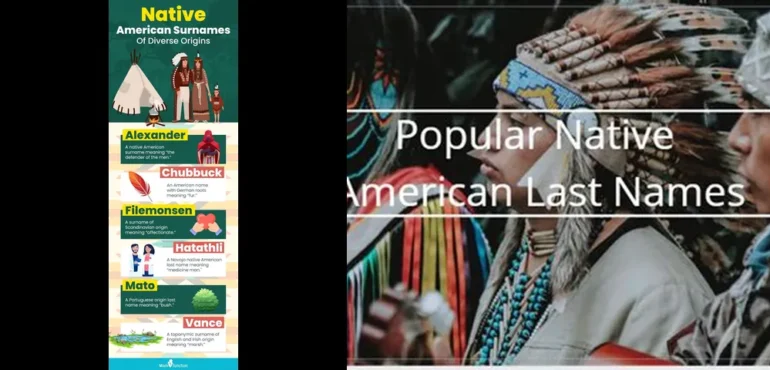Did you know that Native American last names are not just a random combination of letters? They hold a rich history and cultural significance that goes back centuries. In this blog post, we will delve into the fascinating world of Native American last names, decoding their origins and unraveling the unique tapestry of Navajo surnames. From the Indian influence to the European influence, we will explore how these names came to be and their importance in Native American culture. So, grab a cup of coffee and join us on this enlightening journey through the captivating world of Native American last names.
Decoding the History and Significance of Native American Last Names
Embarking on the exploration of Native American last names offers a glimpse into a world where names are steeped in cultural significance and historical depth. These monikers are not just simple tags used for identification; they are a testament to a rich cultural heritage and the changing tides of history. Let’s journey through the narratives encapsulated in these surnames.
Common Native American Last Names and Their Origins
Within the mosaic of Native American surnames, you’ll find a range of words that encapsulate life, nature, and personal tales. Each name carries with it a weight of ancestral history and cultural importance. Here are a few common last names and the stories they tell:
The Story Behind ‘Arrow’
The surname Arrow strikes at the heart of traditional Native American life, harking back to a time when the bow and arrow were essential for survival. This name is a salute to the skillful hunters of the past, their precision, and their intimate relationship with the wild.
Unraveling ‘Blackrock’
Blackrock serves as a geographical fingerprint, often adopted by those with a lineage tied to the Black Rock region. It’s a surname that reflects the intrinsic link between Native American tribes and their lands, echoing their profound reverence for the earth.
| Last Name | Significance |
|---|---|
| Bravebird | Embodies the courage and freedom associated with birds of prey. |
| Chubbuck | Possibly a transformation of a Native name or an adopted English name. |
| Countryman | Indicates a person’s deep relationship with their homeland. |
| Filemonsen | May denote a patronymic origin or an adapted missionary-given name. |
| Huaman | Derived from Quechua, meaning ‘falcon’, signifying vision and power. |
| Pompey | Reflects a name of historical or possibly European influence. |
These names, like many others, function as cultural beacons, helping to preserve the stories and values of the peoples they represent. They are a powerful reminder of the Native American legacy, serving as vessels for identity and tradition.
Navajo Last Names: A Unique Cultural Tapestry
The Navajo tribe, known for their rich tradition and storied past, possess a tapestry of surnames that are particularly distinct. Names such as Bitsillie, Tsinnajinnie, and Todachine are more than just identifiers; they are woven into the very fabric of Navajo identity. Each name tells a part of the tribe’s collective narrative, a narrative rich with cultural significance and historical context. Further insights into Navajo surnames reveal an even deeper connection to this vibrant culture.
In weaving the tales of these last names, we honor the histories of the people who carry them. As we continue to explore the myriad of Native American surnames, we deepen our understanding of the profound connection between identity, culture, and the land that sustains them.
Indian Influence on Native American Last Names
The tapestry of Native American surnames is woven with threads from various cultures, including those from the Indian subcontinent. It’s a fascinating revelation that certain tribes have come to adopt traditional Indian last names, such as Singh, Kumbhar, Sutar, Kulkarni, Deshpande, Deshmukh, Patil, Pawar, Desai, and Joshi. These surnames, deeply entrenched in Indian heritage, often signal the bearer’s lineage or ancestral vocation, weaving a rich narrative about the individual’s background.
For example, the name Singh, traditionally a common surname among the Sikh community, signifies ‘lion’ and conveys a sense of bravery and strength. In the Native American context, the adoption of such names has added a layer of complexity to the cultural identity and ancestry of individuals. The intermingling of Indian and Native American cultures may have historical roots in trade, intermarriage, or shared colonial experiences, which have left an indelible mark on the nomenclature traditions among these communities.
European Influence on Native American Last Names
European colonization and the missionary movement have also left a significant imprint on Native American naming conventions. The adoption of European surnames by Native Americans is a testament to the complex history of cultural exchange and assimilation. It is not uncommon to encounter Native Americans with Hispanic or French last names, a legacy of Catholic missions, while English or Scottish surnames may point to the influence of Protestant missionaries. These European names, once external to Native traditions, have become entwined with Native identity over generations.
For instance, a Native American with the last name Chavez or Dupont may trace their ancestry back to a time when their forebears interacted with Spanish or French missionaries, respectively. Similarly, surnames like Wilson or McGregor could reflect the encroachment of English or Scottish settlers and the subsequent cultural entanglement. These European-derived surnames serve as historical markers, revealing stories of conversion, alliance, and sometimes, coercion.
The Advent of Last Names in Native American Culture
The turn of the 20th century marked a pivotal moment in the evolution of Native American identity with the introduction of last names into their cultural practice. This adoption was not merely about names; it represented a deeper transition in the way Native Americans navigated their place in a rapidly changing world. The choice of surnames ranged from those derived from non-Indian origins to those that were translations of native terms into European languages. This period illustrates a rich chapter in the unfolding narrative of Native American resilience and adaptability.
Some Native Americans selected surnames that echoed their ancestral professions or characteristics, akin to the Indian influence, while others embraced names that facilitated their interaction with the broader society. This crucial shift enabled Native Americans to preserve their heritage and assert their identity in a landscape dominated by European cultural norms. The names serve as a bridge between the past and the present, ensuring that the legacy of the Native American people continues to resonate through generations.
Conclusion
The tapestry of Native American last names unfurls a rich palette of historical and cultural significance that is deeply woven into the fabric of North America’s heritage. These surnames are not mere tags for identification; they serve as a profound expression of ancestral pride, a narrative of resilience, and an emblem of the diverse indigenous communities that have thrived across the continent.
Take for instance the surname ‘Arrow’, which doesn’t just denote a family name but also echoes the ancestral skill of archery, vital for survival and revered as an art form. The name ‘Blackrock’, speaks volumes about the deep connection to a place that Native Americans hold sacred, symbolizing their bond with the earth and the landscapes they have cherished for millennia.
Similarly, names like ‘Bravebird’ or ‘Pompey’ encapsulate personal attributes and historical events that are significant to the tribe’s lineage. These surnames have transcended time, carrying with them the legacies of warriors, healers, and leaders who have shaped the course of their people’s history.
In the wake of European colonization, the adoption of surnames such as ‘Chubbuck’ or ‘Countryman’ reflect a period of cultural assimilation and adaptation, showcasing the enduring spirit of Native Americans to maintain their identity amidst changing times. The introduction of surnames like ‘Filemonsen’ or ‘Huaman’ further illustrates the intricate interplay between native traditions and external influences.
As we delve into the stories behind these last names, we gain invaluable insights into the socio-cultural evolution of Native American tribes. Their adoption of last names was a pivotal moment in history, marking a transition as they navigated new social landscapes while striving to preserve the essence of their cultural identity.
Today, these last names continue to be a source of pride and identity for many, as they honor their ancestors and pass on the torch of their cultural legacy to the younger generations. They are living relics of the past, a testament to the resilience and adaptability of Native American societies.
In summary, each Native American last name is a key that unlocks a story, a piece of history, and a glimpse into the lives and values of the people who bear them. They are not just names but a continuous celebration of heritage, ensuring that the legacy of the Native American people endures and flourishes through the ages.
Q: Do Native Americans use last names?
A: Yes, by 1900, Native Americans began adopting the custom of adding surnames or family names after their personal or first names.
Q: What types of last names did Native Americans adopt?
A: By 1900, many Native Americans started using names of non-Indian origin, such as English, French, or Spanish names. Some names of Indian origin were also translated into English, French, or Spanish.
Q: Why do some Native Americans have European last names?
A: Some Native Americans have European last names because most reservations were at some point run by missionaries. Natives who converted to Christianity or were only nominally Christian often adopted European last names. For example, Hispanic or French surnames are common among Natives associated with Catholic missions, while English or Scottish last names are more prevalent among those associated with Protestant missions.



